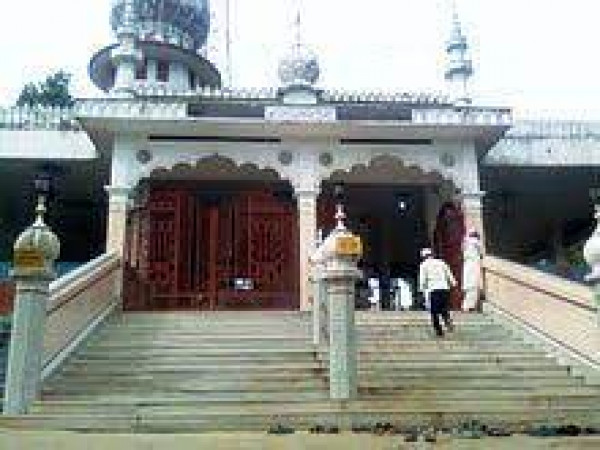Hajo Travel Guide
Hajo is a small town located in the Indian state of Assam, known for its rich historical and cultural significance. Situated on the banks of the Brahmaputra River, Hajo is famous for its ancient temples, diverse religious heritage, and picturesque landscapes. The town has been a prominent pilgrimage center for Hindus, Buddhists, and Muslims for centuries, making it a melting pot of different traditions and beliefs.Top Attractions in Hajo
- Kamakhya Temple
- Hayagriva Madhava Temple
- PoAchali Wildlife Sanctuary
- Hajo Powa Mecca
- Sualkuchi Silk Village
Hajo is Famous for
Hajo is most famous for its religious diversity and the presence of sacred sites that attract pilgrims from all over the country.Top Attractions in Hajo
- Explore the Kamakhya Temple, dedicated to the goddess Kamakhya
- Visit the Hayagriva Madhava Temple, an ancient pilgrimage site
- Experience the wildlife at PoAchali Wildlife Sanctuary
- Discover the unique Hajo Powa Mecca, a mosque with a blend of Hindu and Islamic architecture
- Shop for exquisite silk products at Sualkuchi Silk Village
What's Great about Travelling to Hajo?
- Experience the spiritual ambiance of the town
- Explore the diverse religious heritage
- Enjoy the scenic beauty of the Brahmaputra River
What's Not So Great about Travelling to Hajo?
- Limited accommodation options
- Some areas may not be easily accessible for people with mobility issues
- Monsoon season can bring heavy rainfall and disrupt travel plans
Travel Tips for Hajo
- Carry sufficient cash as ATMs may be limited
- Respect the religious customs and traditions of the local community
- Be cautious of wildlife while visiting the sanctuary
Important Hajo trip information
- Ideal Duration: 2-3 days
- Best Time to Visit: October to March
- Nearby Airports and Railway Stations: Lokpriya Gopinath Bordoloi International Airport in Guwahati, Guwahati Railway Station
FAQ's on Hajo
Q1: What is the best time to visit Hajo?
The best time to visit Hajo is during the winter months from November to February when the weather is cool and pleasant. This period also coincides with the festive season, offering a chance to witness local celebrations. However, if you prefer warmer weather, the spring months of March to May are also a good time to visit. Avoid the monsoon season from June to September due to heavy rainfall.
Q2: Do I need a visa to travel to Hajo?
Most tourists will require a visa to travel to Hajo. It is advisable to check with the nearest consulate or embassy for specific visa requirements based on your nationality. Some countries may be eligible for visa-on-arrival or e-visa facilities, so make sure to research and apply for the necessary visa ahead of your trip.
Q3: What are the must-visit attractions in Hajo?
Hajo boasts several must-visit attractions, including the Hajo Powa Mecca, Hayagriva Madhava Temple, and Madan Kamdev archaeological site. Nature lovers can explore the Saraighat Bridge and enjoy bird watching at Deepor Beel Wildlife Sanctuary. Don't miss the chance to witness the traditional silk weaving at Hajo Silk Village.
Q4: Is Hajo a safe place to travel?
Hajo is generally a safe place to travel, but like any destination, it's important to take precautions. Avoid isolated areas at night, be cautious of pickpocketing in crowded places, and respect local customs. Stay informed about any travel advisories and be vigilant while exploring the city.
Q5: What is the local currency in Hajo and can I use credit cards?
The local currency in Hajo is the Indian Rupee (INR). ATMs are available in major cities, but it's advisable to carry cash when visiting rural areas. Credit cards are accepted in some hotels, restaurants, and larger stores, but it's recommended to have cash on hand for smaller establishments and local markets.
Q6: What is the local cuisine like in Hajo?
Hajo offers a diverse culinary experience with dishes like Assam Laksa, Masor Tenga (sour fish curry), and Pitha (rice cakes). Vegetarians can enjoy dishes like Aloo Pitika (mashed potatoes) and Khar (alkaline dish). Don't miss the opportunity to taste authentic Assamese tea and local sweets like Narikol Laru (coconut laddu).
Q7: What transportation options are available in Hajo?
Transportation options in Hajo include buses, auto-rickshaws, and taxis for local travel. Renting a car or hiring a driver is also a convenient way to explore the region. Public buses connect major cities, while private taxis offer a more flexible travel experience. Trains are available for longer journeys within the country.
Q8: Are there any cultural norms or etiquette I should be aware of when visiting Hajo?
When visiting Hajo, it's important to respect local customs and traditions. Dress modestly when visiting religious sites, remove shoes before entering temples, and seek permission before photographing locals. Greeting with "Namaskar" is common, and showing respect to elders is appreciated. Avoid public displays of affection and be mindful of cultural sensitivities during your stay.
Q9: I am a travel agent. How can I buy travel leads of Hajo?
Register yourself as a travel agent at agents.tripclap.com and then you can buy travel leads to Hajo once your account is approved. For more details contact our support team at +91-8069186564 or support@tripclap.com

